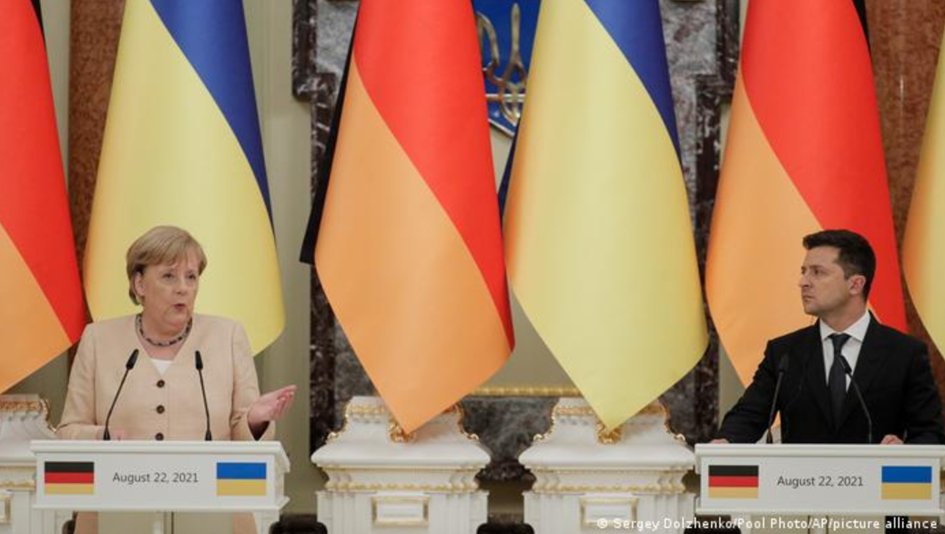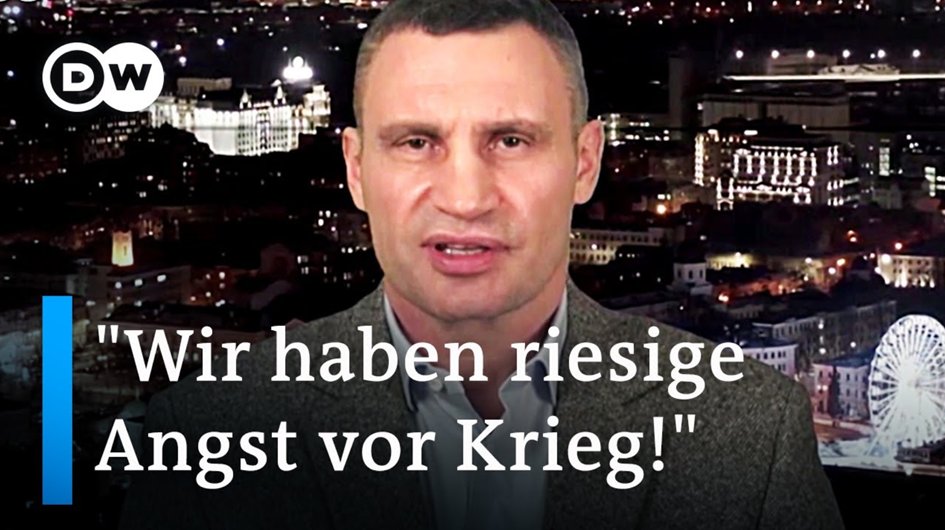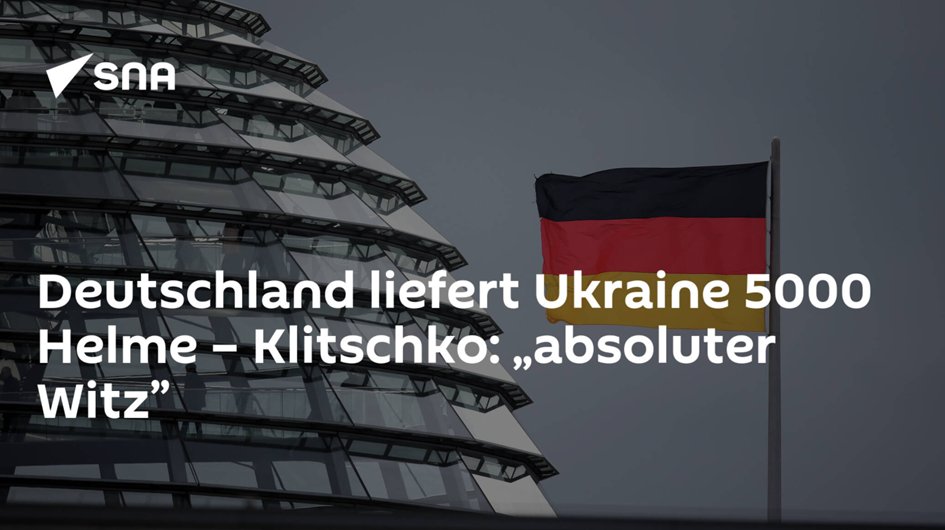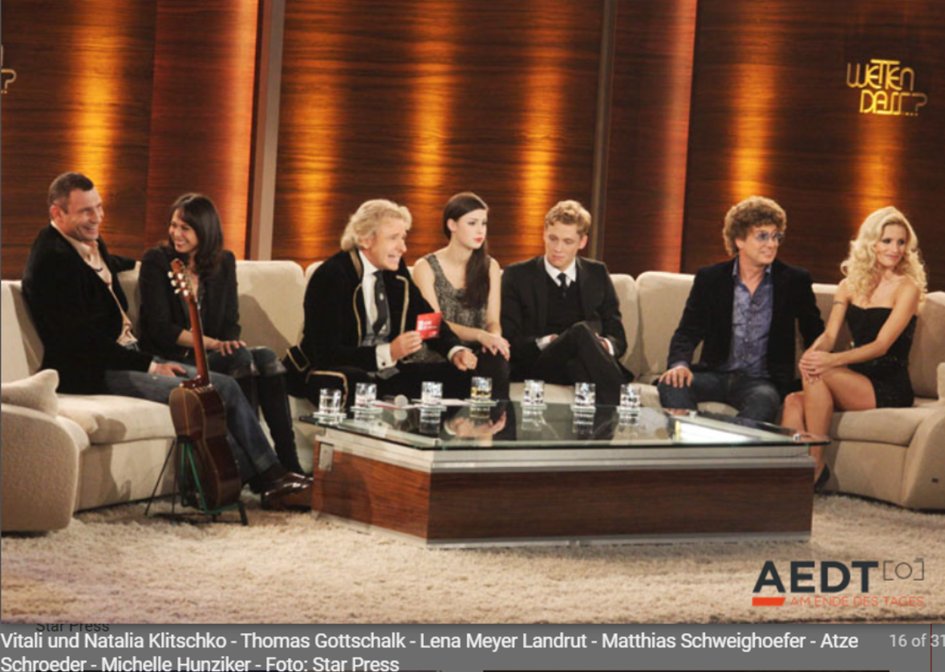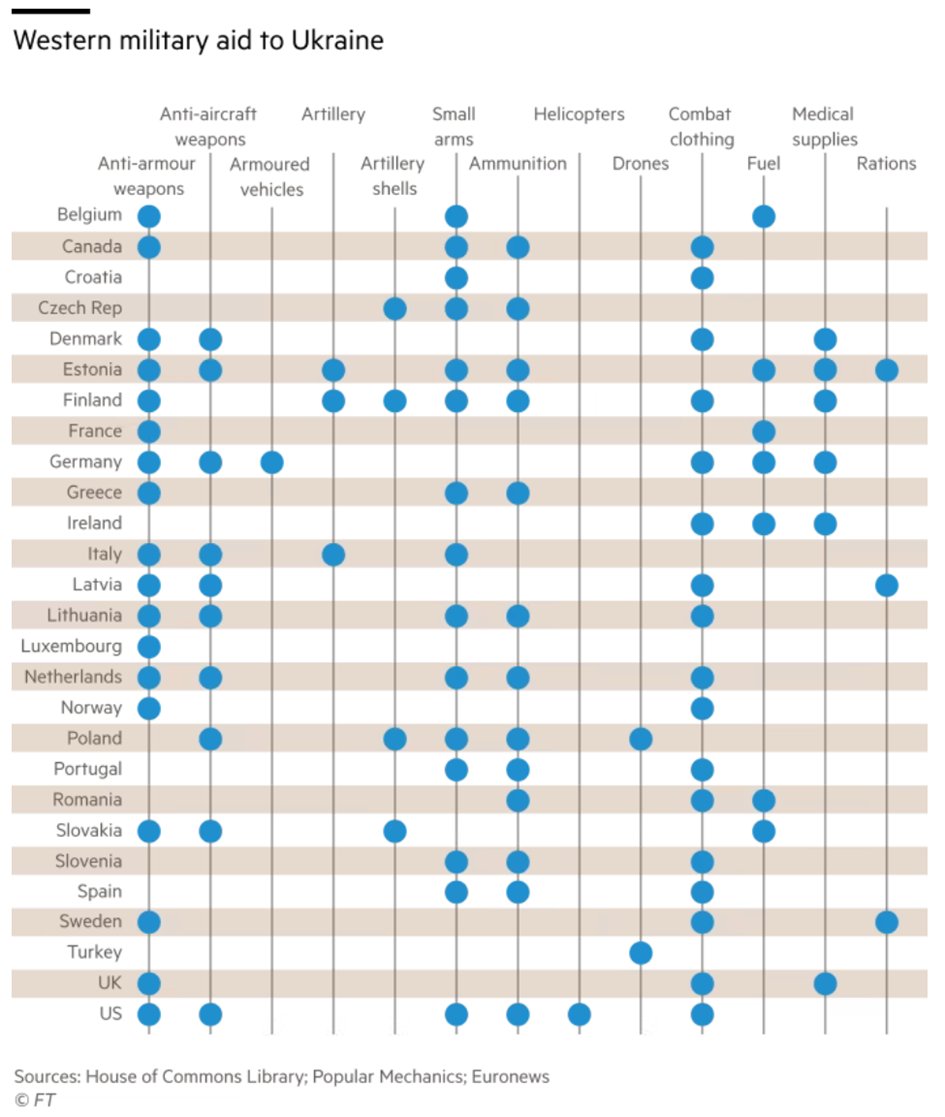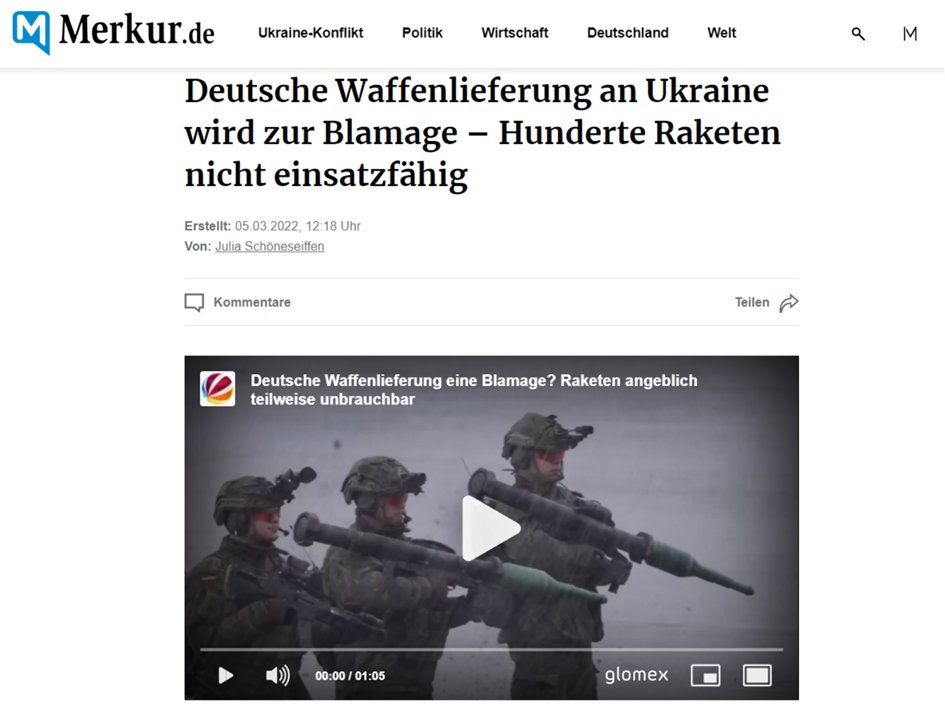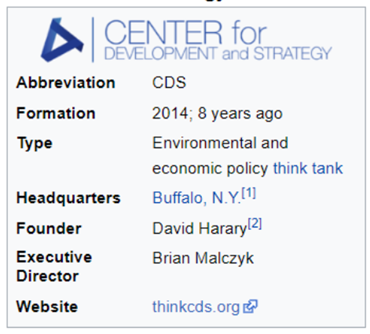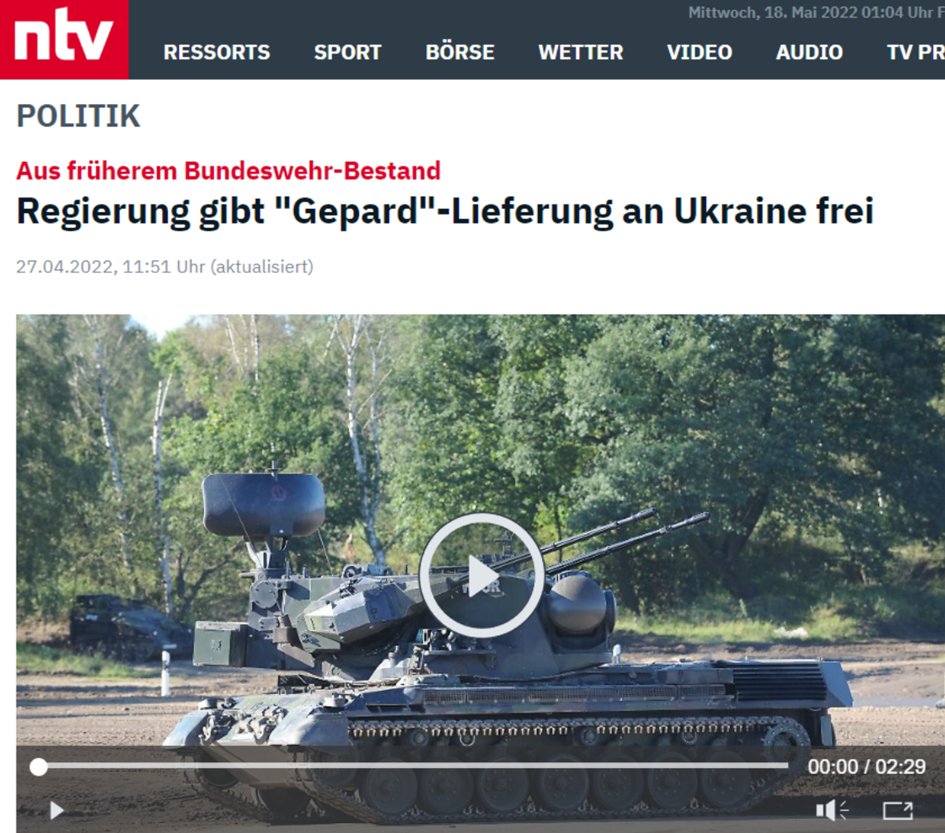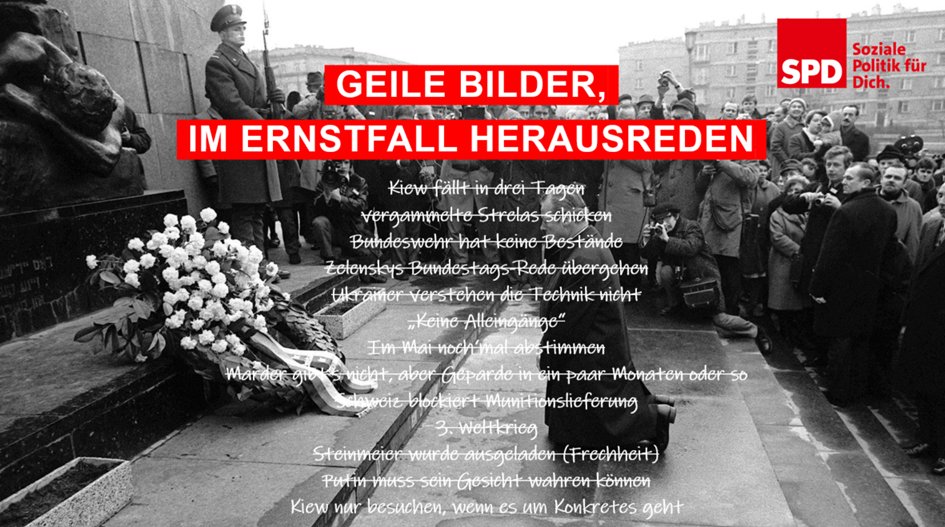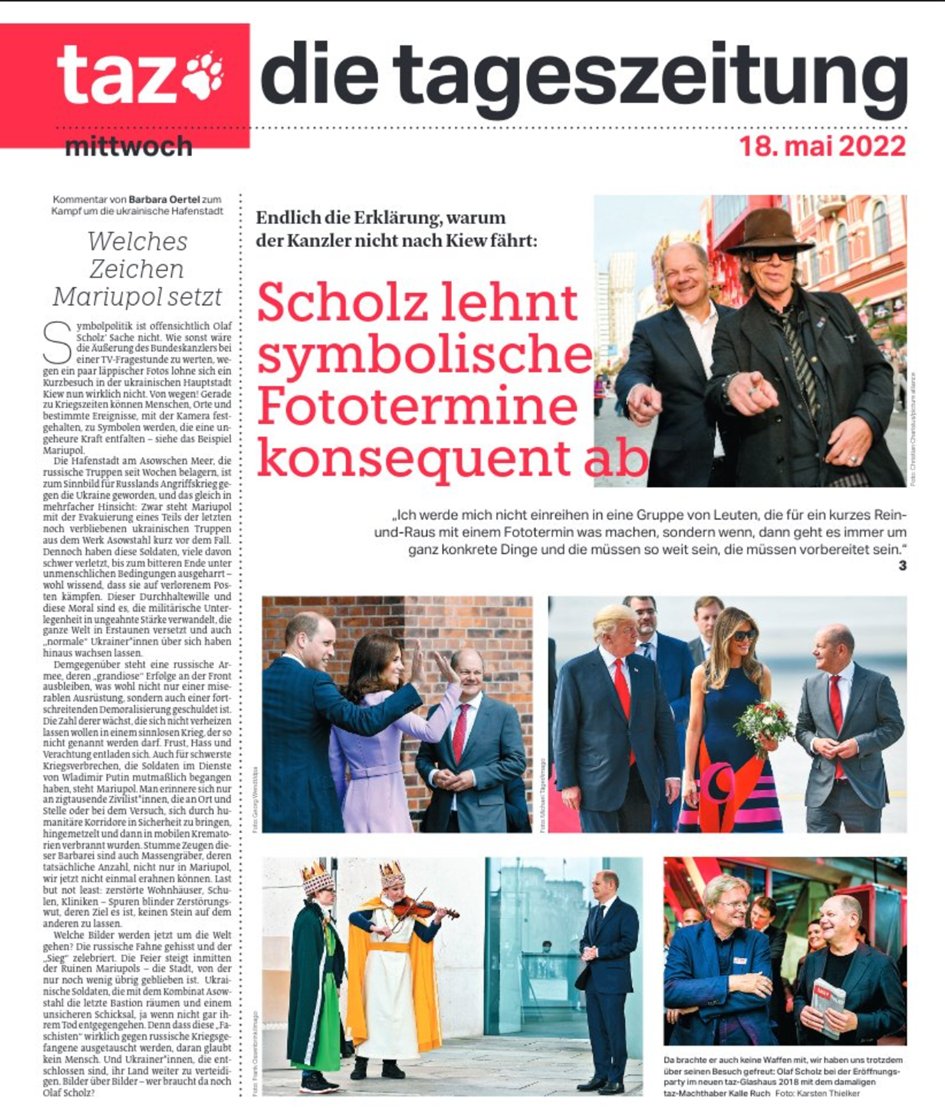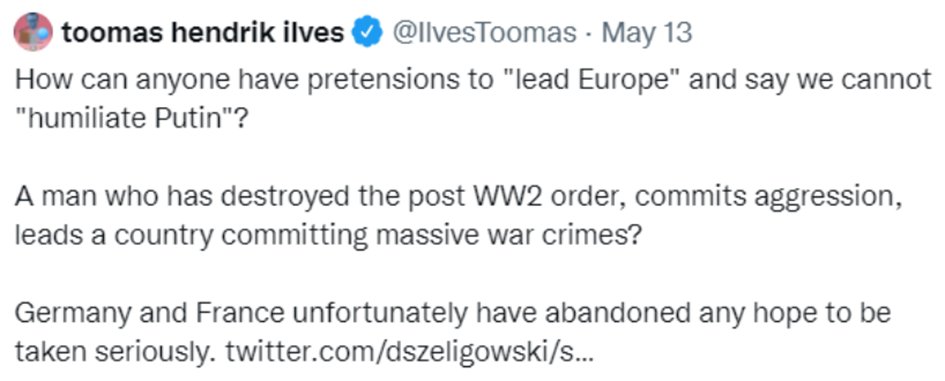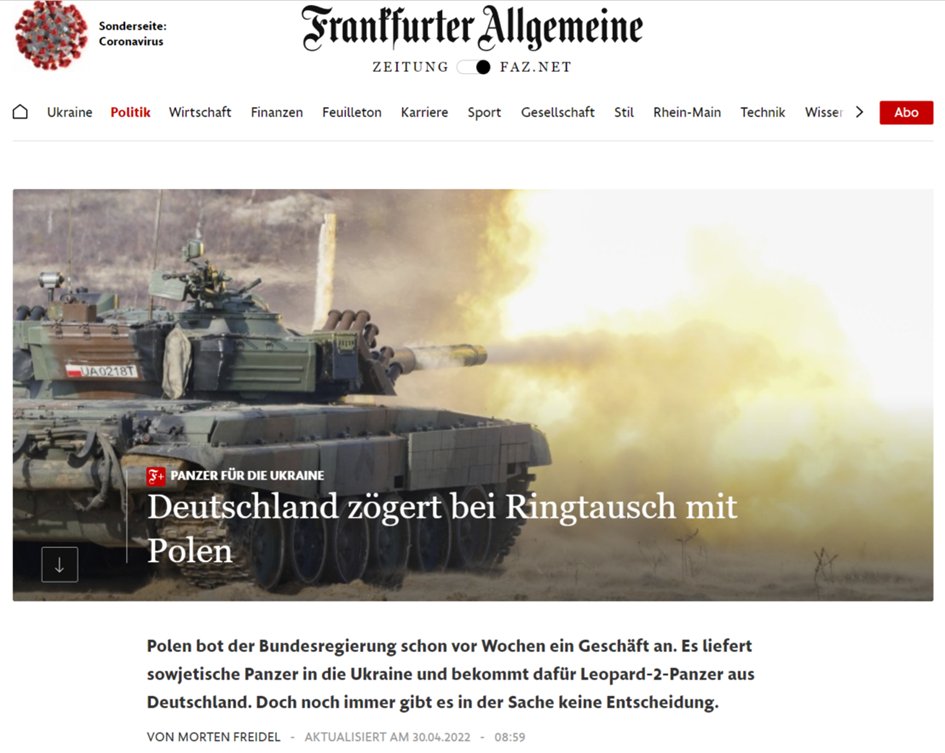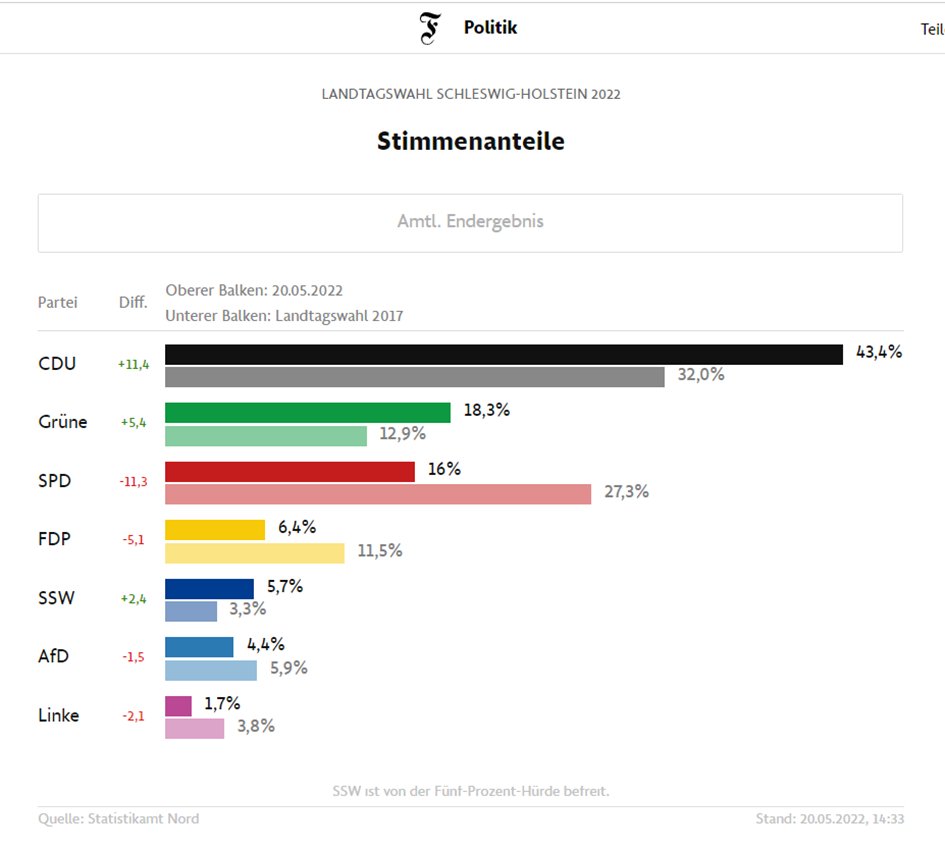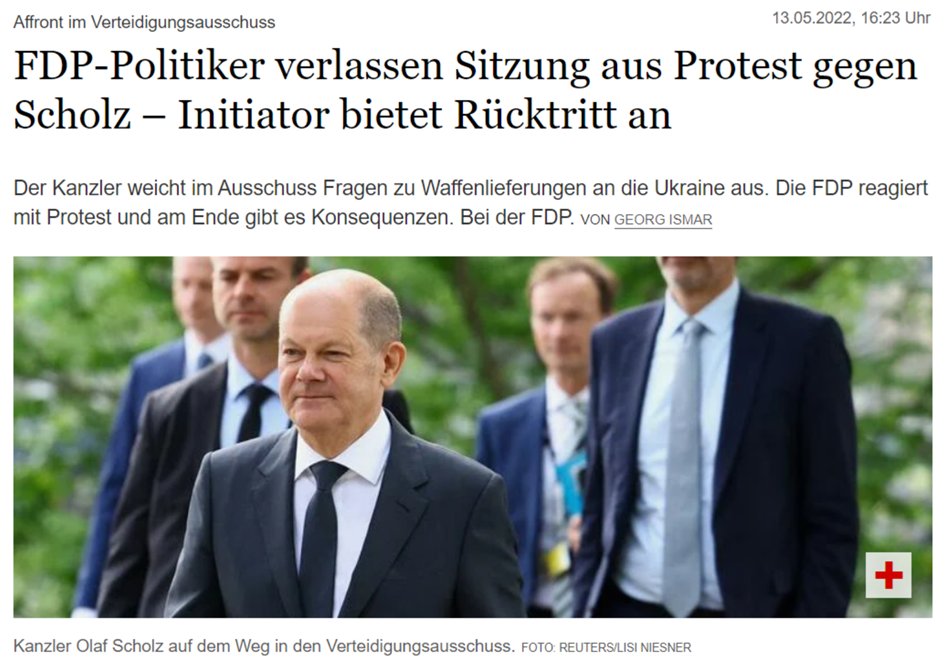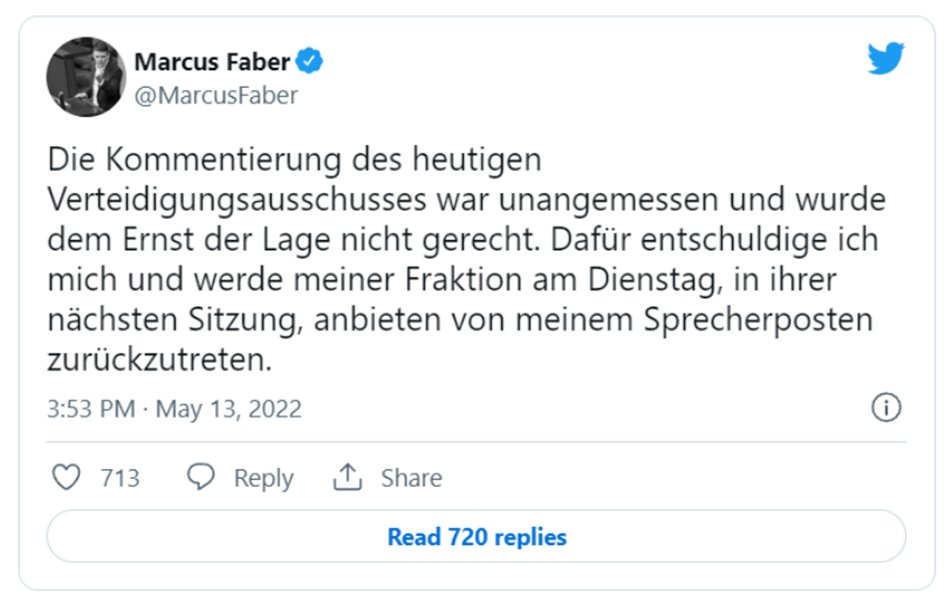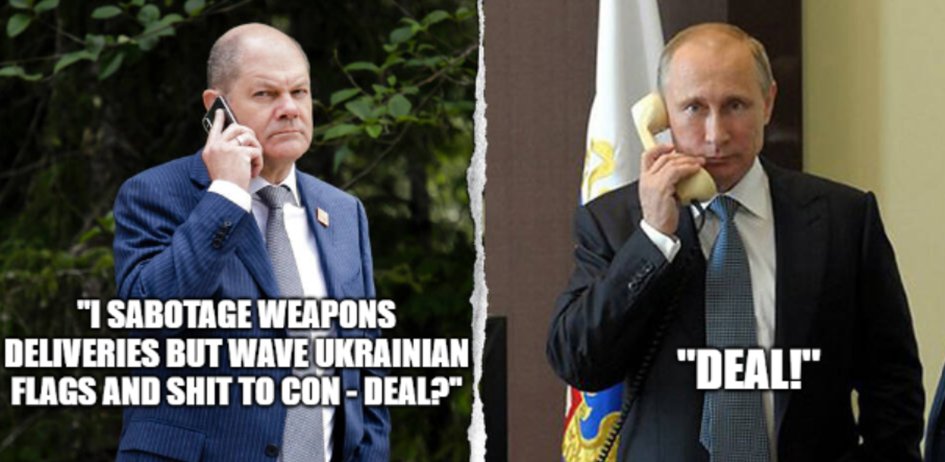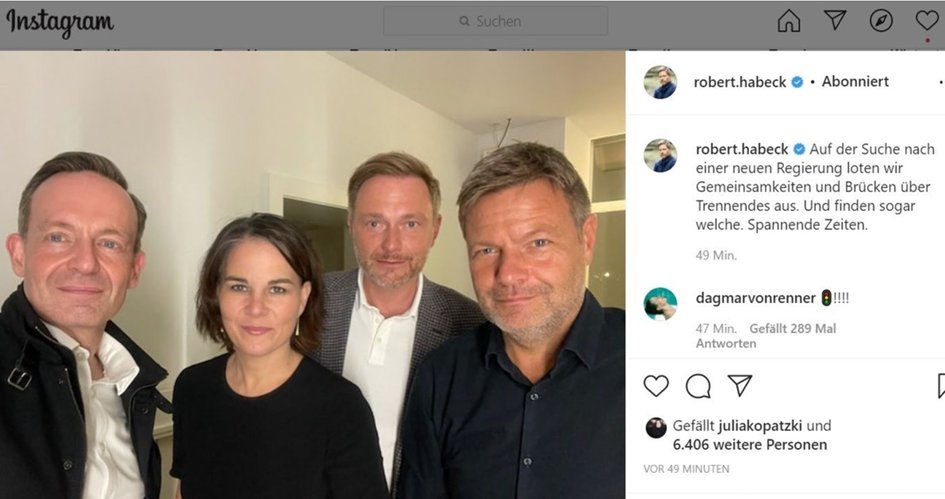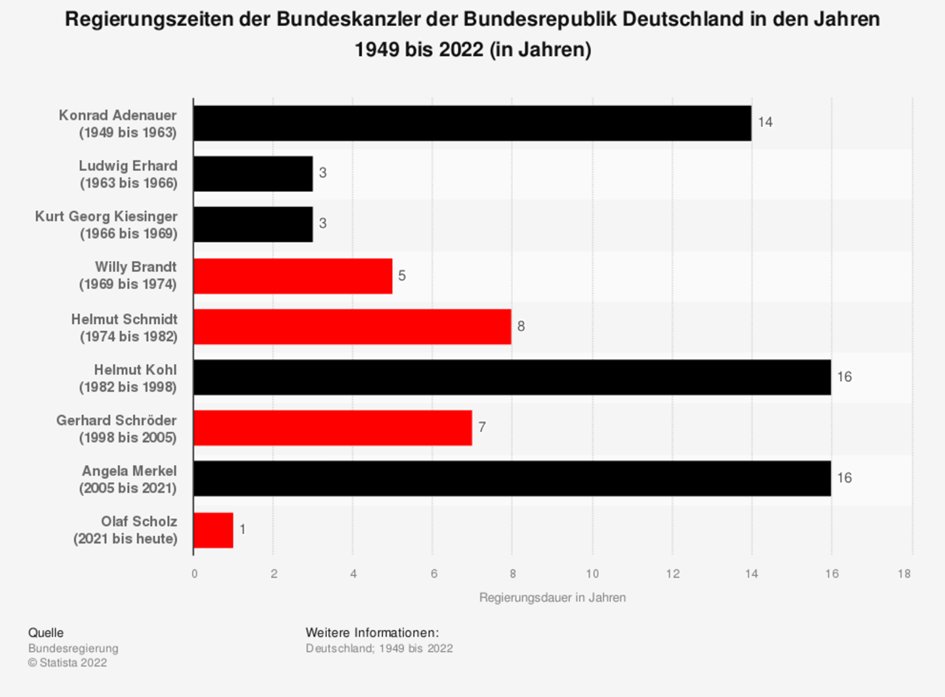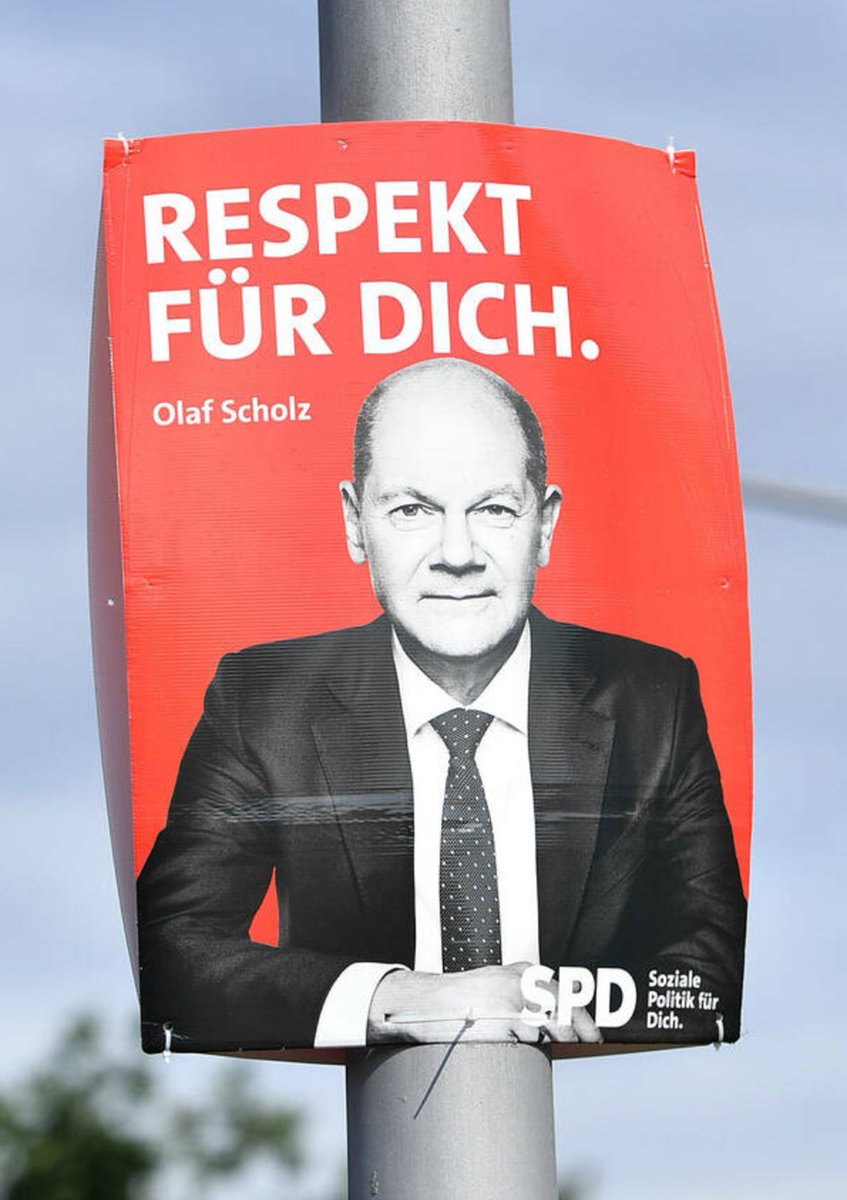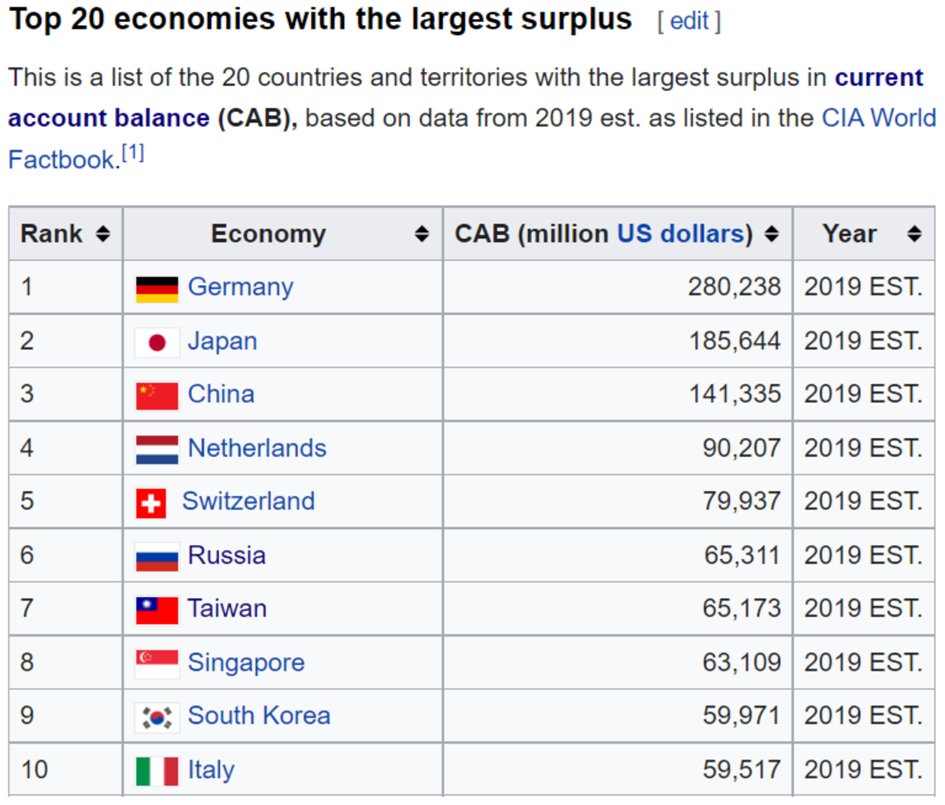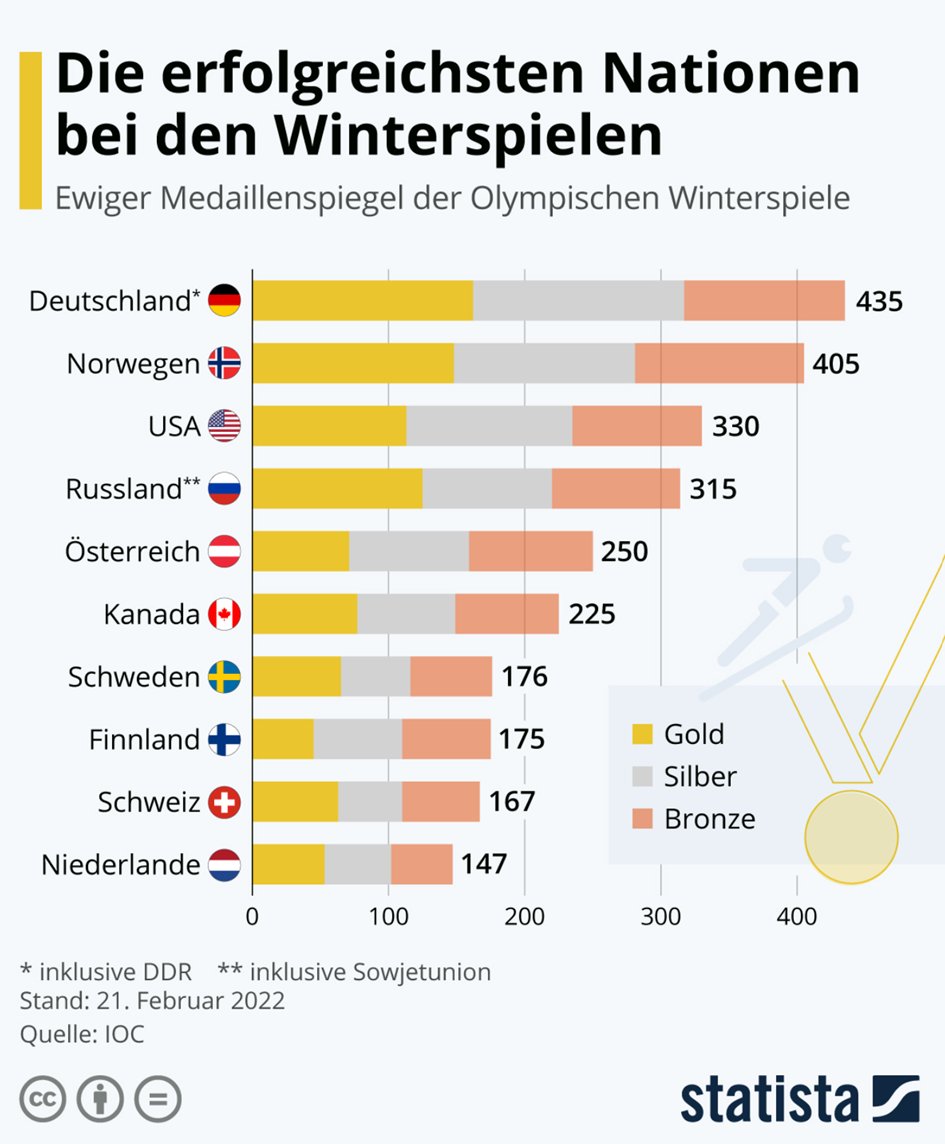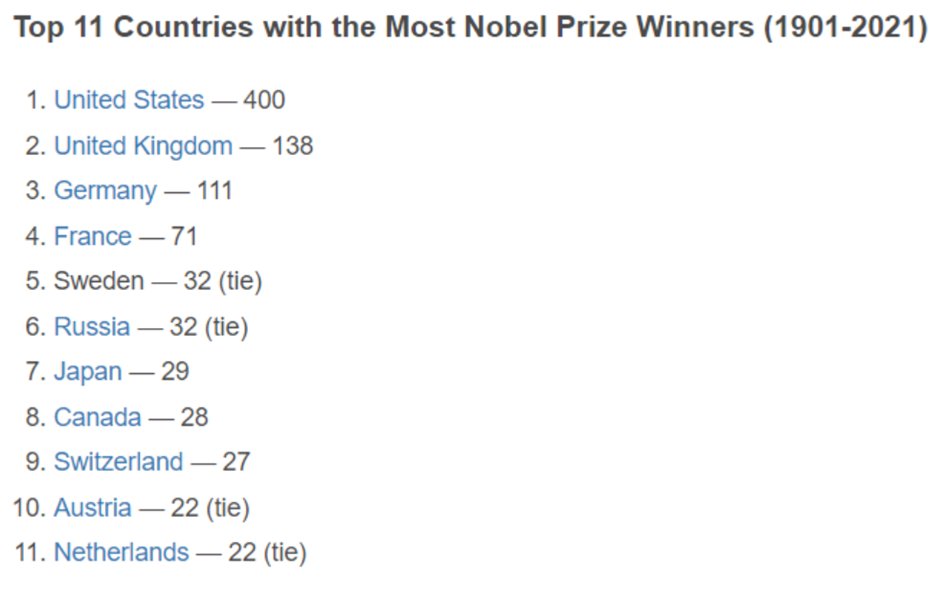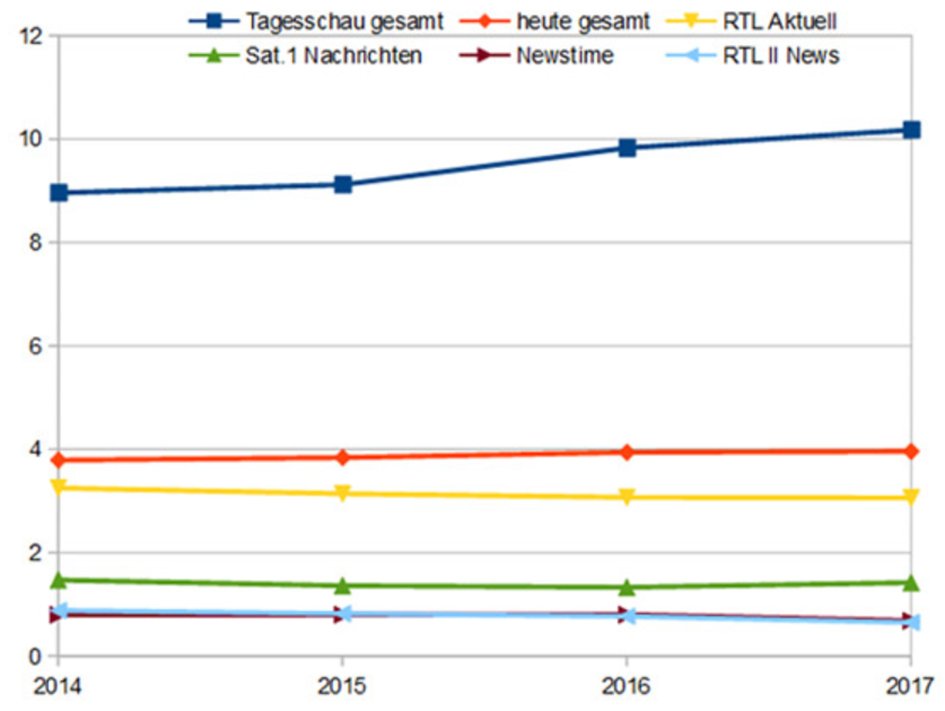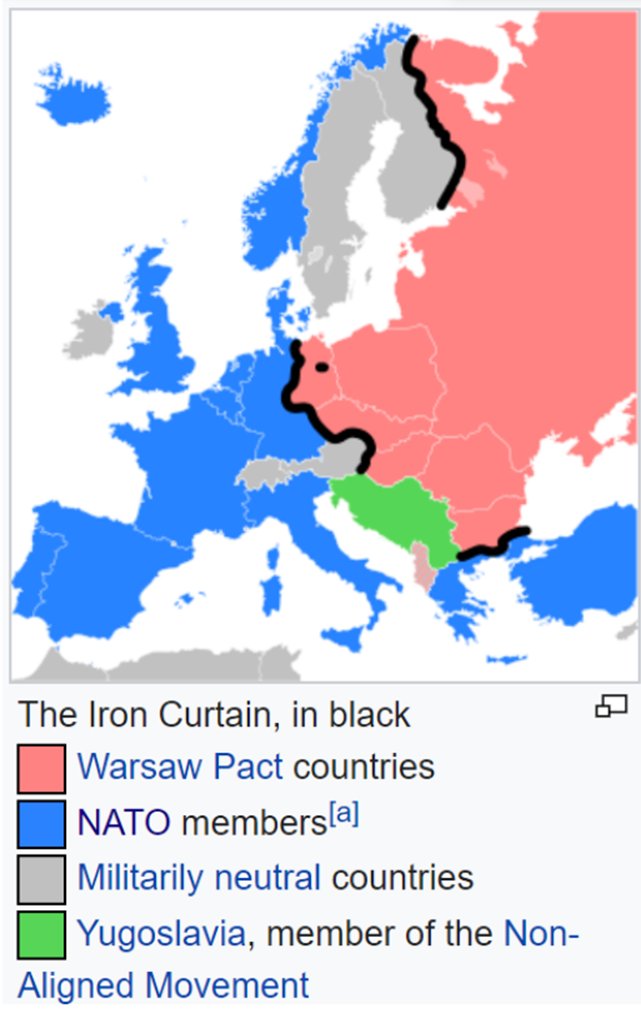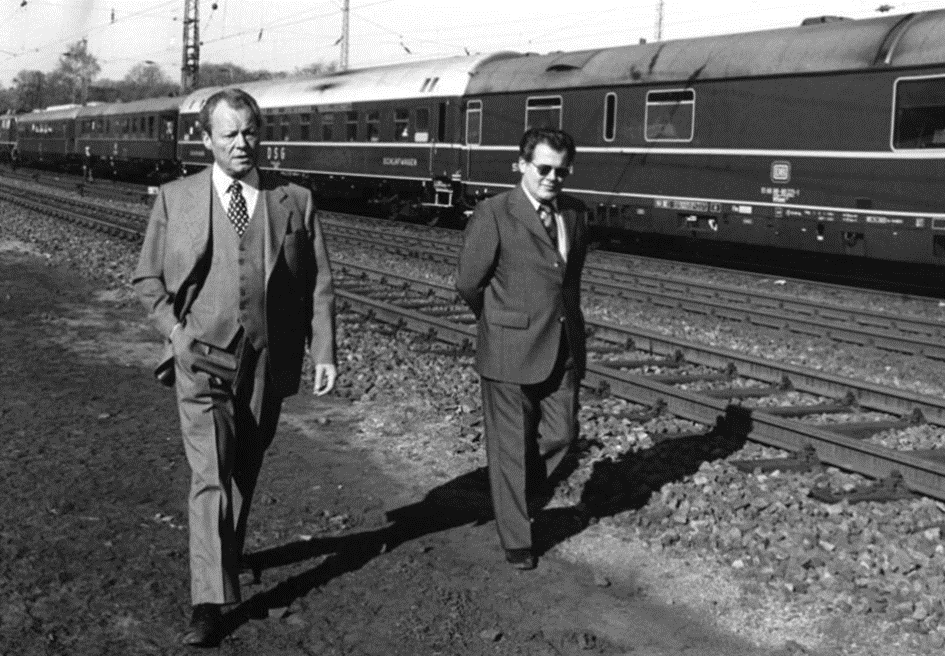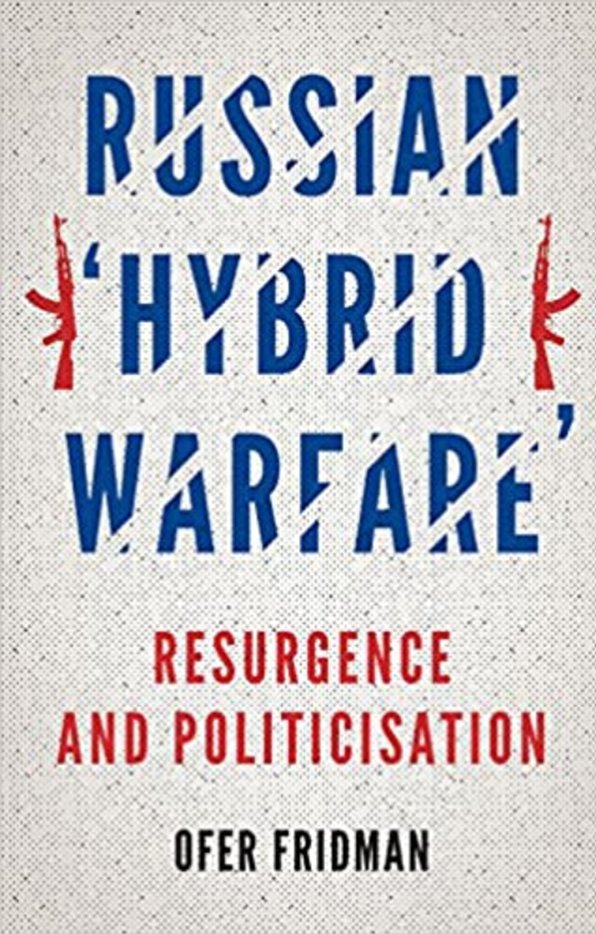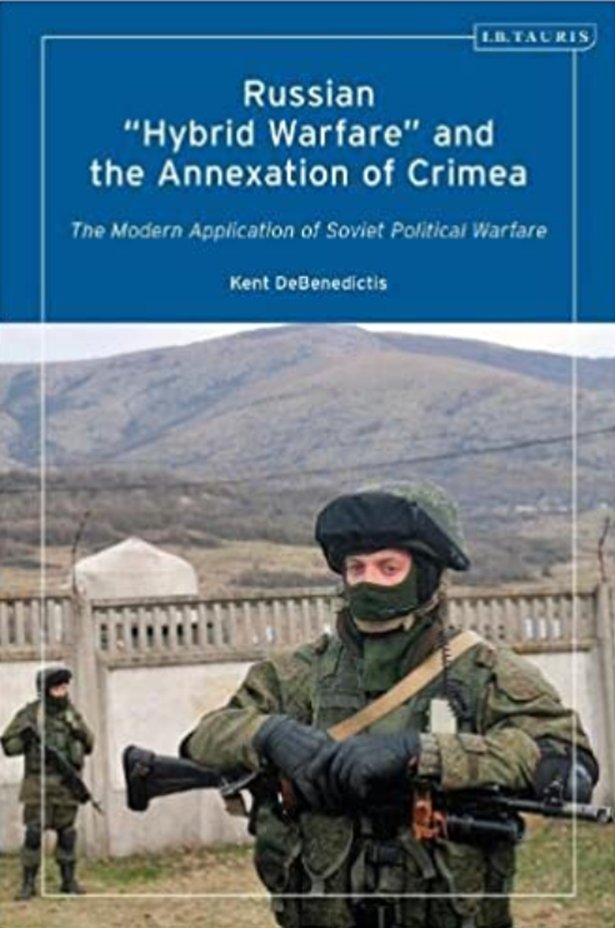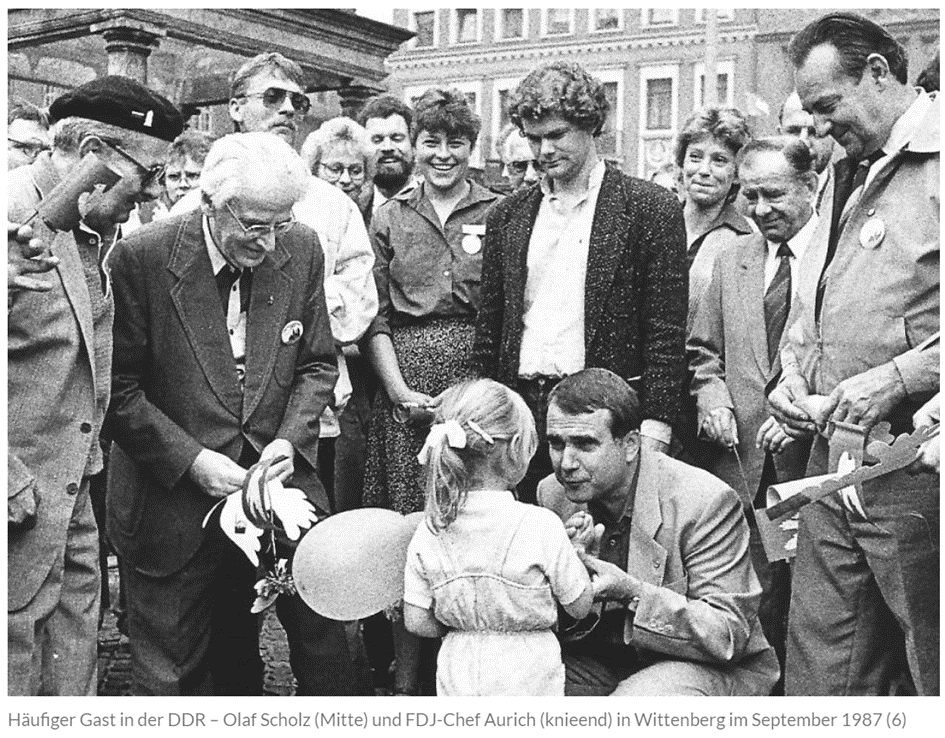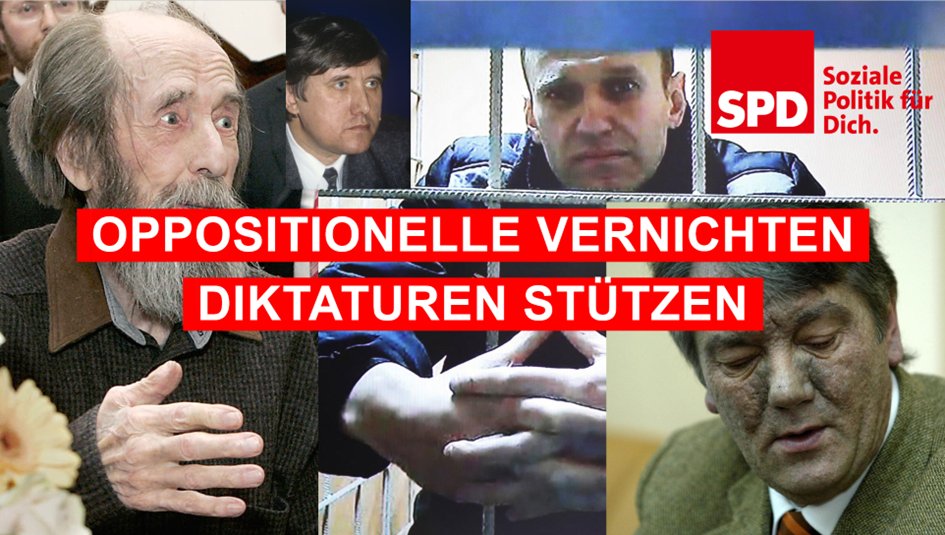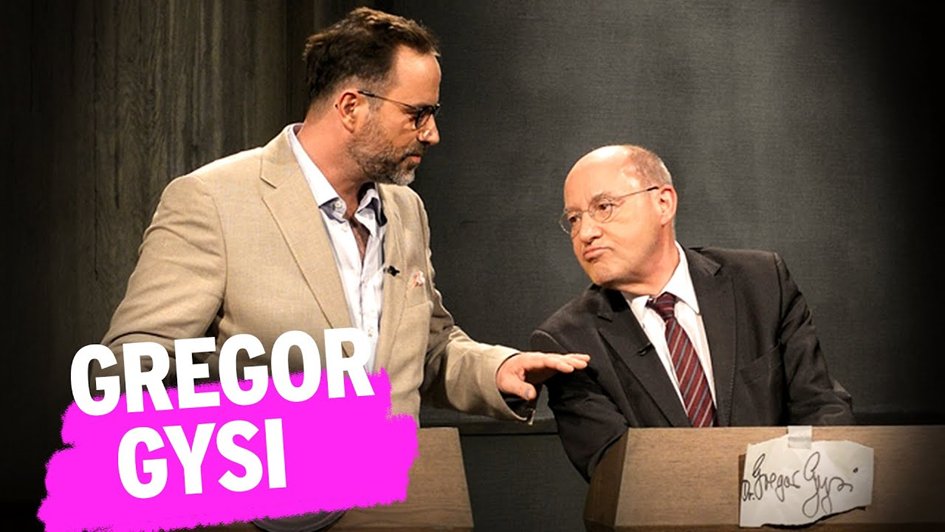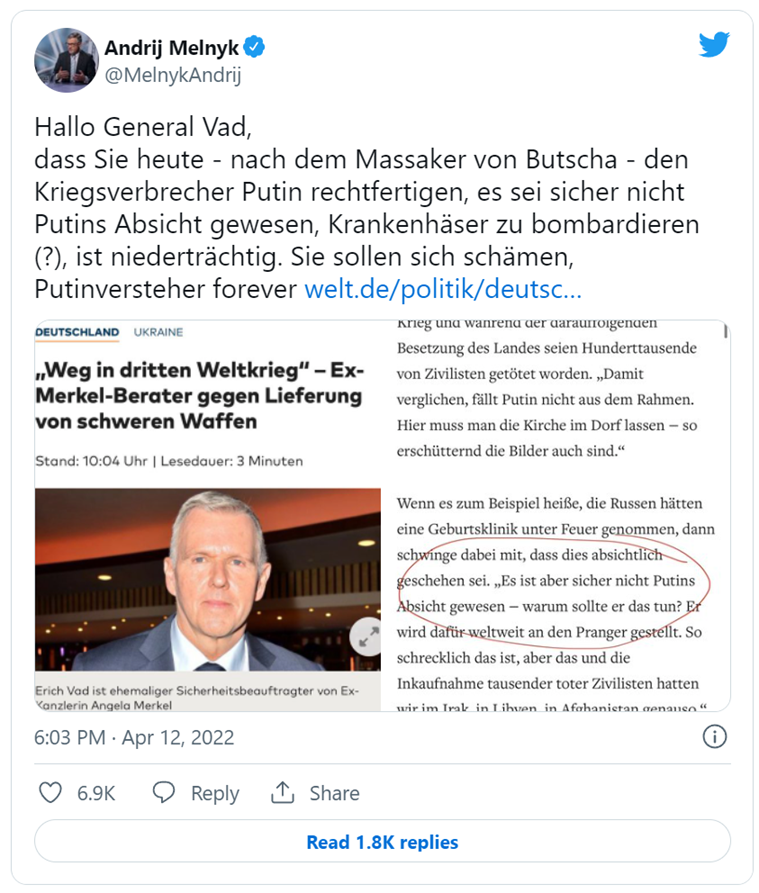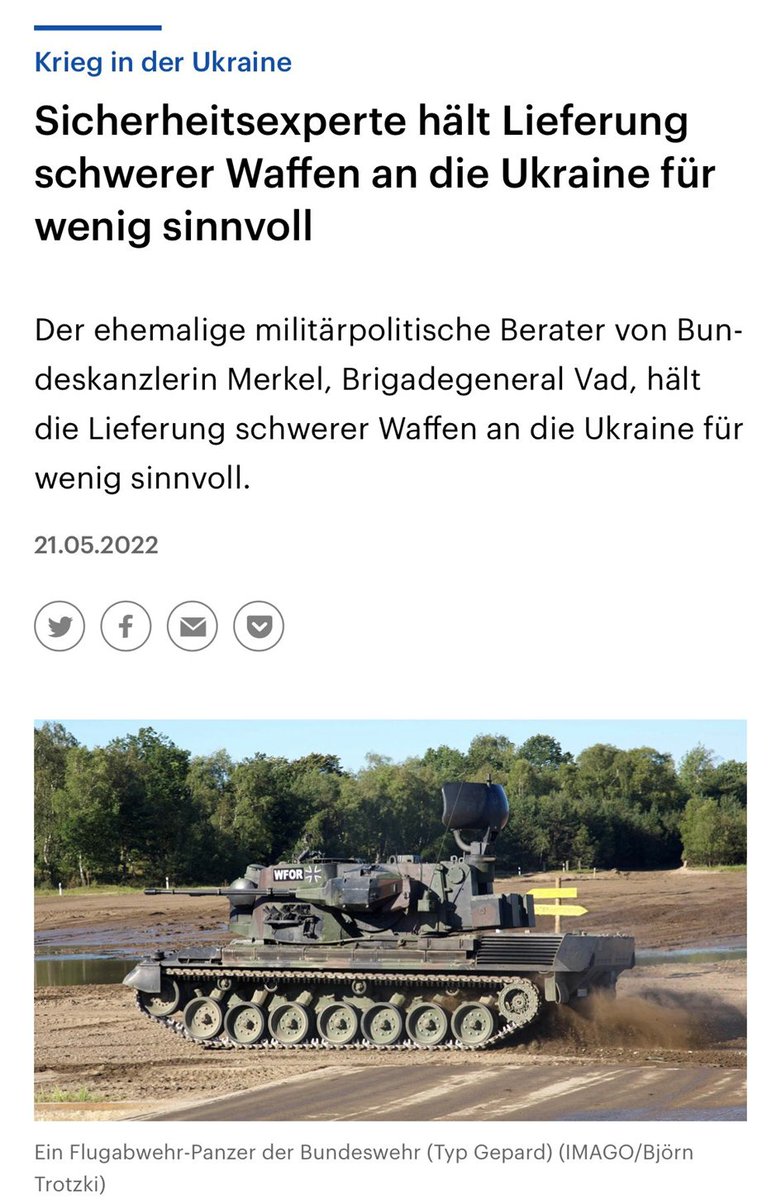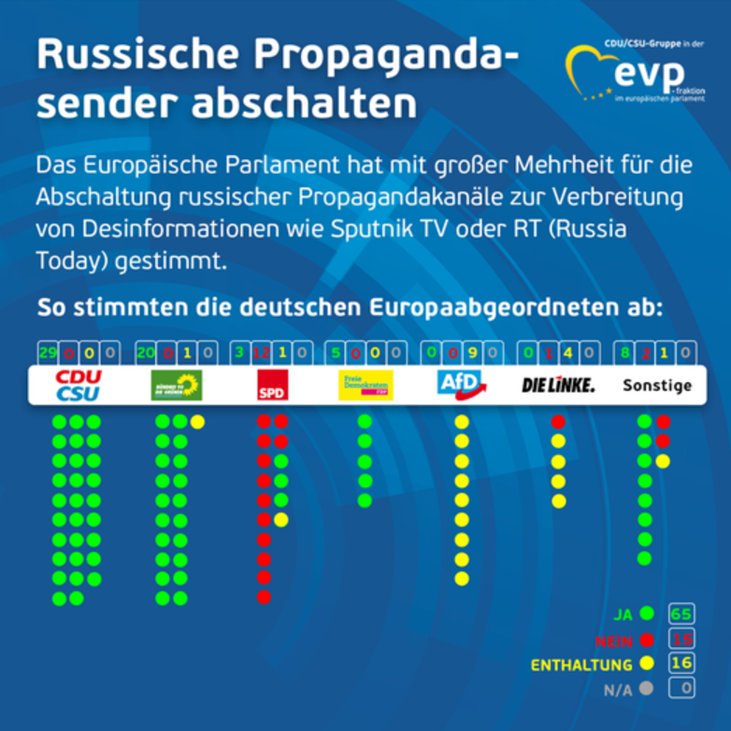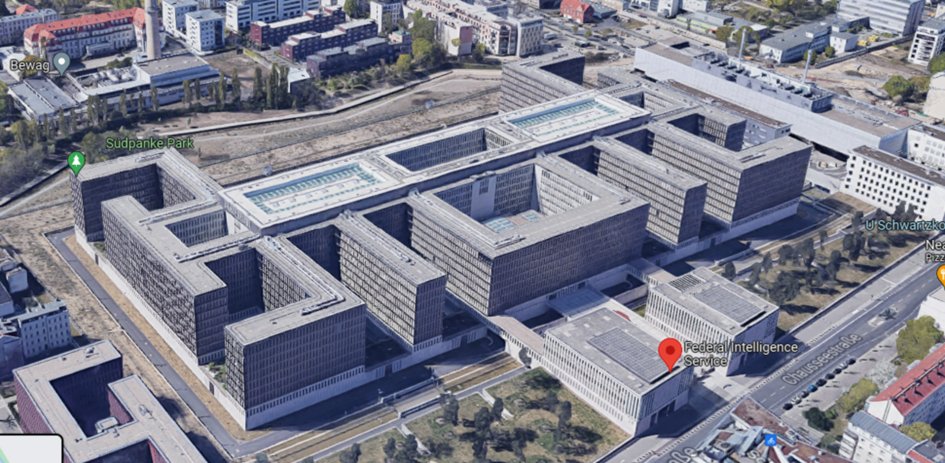Why does Germany act so indecisive & unreliable at supporting Ukraine& #39;s defense efforts?
It& #39;s not moral or economic risk management. It& #39;s a mix of cultural isolationism, soviet propaganda and strategic infiltration by Putin’s assets deep into political & cultural leadership.
 https://abs.twimg.com/emoji/v2/... draggable="false" alt="🧵" title="collectie" aria-label="Emoji: collectie">
https://abs.twimg.com/emoji/v2/... draggable="false" alt="🧵" title="collectie" aria-label="Emoji: collectie">
It& #39;s not moral or economic risk management. It& #39;s a mix of cultural isolationism, soviet propaganda and strategic infiltration by Putin’s assets deep into political & cultural leadership.
I start with a recap.
Under Merkel, German policy towards Ukraine was distant, likely to appease Putin.
2008 Merkel blocks NATO membership for Ukraine, and expresses hesitance at a quick path for EU membership.
Germany supports Ukraine to flourish as the neutral buffer state.
Under Merkel, German policy towards Ukraine was distant, likely to appease Putin.
2008 Merkel blocks NATO membership for Ukraine, and expresses hesitance at a quick path for EU membership.
Germany supports Ukraine to flourish as the neutral buffer state.
Germans considered Putin& #39;s 2014 de facto invasion into Crimea and the Donbas widely as an illegal act by Russia.
Merkel wanted a tougher stance towards Putin but economic pragmatists and russophils achieved only a few rather weak sanctions on EU level as retaliation measures.
Merkel wanted a tougher stance towards Putin but economic pragmatists and russophils achieved only a few rather weak sanctions on EU level as retaliation measures.
Despite a lot of talk of German alleged leadership in Europe, there was not very much public interest on Russia& #39;s aggression towards Ukraine in 2014.
Disputes about how to react to Putin& #39;s land grab happened but it was never a debate about taking really decisive action.
Disputes about how to react to Putin& #39;s land grab happened but it was never a debate about taking really decisive action.
Then there is Nord Stream 2
The gas pipeline is unnecessary due to already built pipelines
Russia wanted NS2 to make Jamal redundant - Gazprom paid €9.5m for it
The US, Ukraine, Poland, all understood this
The US tried to stop NS2 with sanctions
But Germans followed through
The gas pipeline is unnecessary due to already built pipelines
Russia wanted NS2 to make Jamal redundant - Gazprom paid €9.5m for it
The US, Ukraine, Poland, all understood this
The US tried to stop NS2 with sanctions
But Germans followed through
Russia moved their army to the Ukrainian border in early 2022.
Biden started to publicly forecast the invasion based on his intel. The Ukrainians knew what was coming and asked for weapons.
Germany sent only 5000 old army helmets.
Kiev& #39;s mayor Klitschko was furious.
Biden started to publicly forecast the invasion based on his intel. The Ukrainians knew what was coming and asked for weapons.
Germany sent only 5000 old army helmets.
Kiev& #39;s mayor Klitschko was furious.
As background: the Klitschko brothers are extremely famous in Germany from their boxing career. They speak German well.
That is why he was the Ukrainian media voice in Germany early in the war.
That is why he was the Ukrainian media voice in Germany early in the war.
From Klitschko& #39;s voice I was hoping and expecting that Germany can act closely alined with Ukraine. There was someone everybody knew and respected to sell tough and costly measures that had to be taken.
But the helmets incident already foreshadowed what was to follow.
Germany sent aid but usually rather later than sooner and often with caveats.
This overview is from mid March.
Germany sent aid but usually rather later than sooner and often with caveats.
This overview is from mid March.
The next story was about the Strelas, shoulder mounted air defense rockets from the Soviet era.
Germany delivered many, but they were defective due to rust and mold - this must have been noticed before shipping.
A US think tank alleges sabotage by Germany.
Germany delivered many, but they were defective due to rust and mold - this must have been noticed before shipping.
A US think tank alleges sabotage by Germany.
Ukraine asks for heavy weapons and armored vehicles.
German defense industry is a power house. Rheinmetall and KMW are among the global industry leaders.
Great opportunities for these companies.
But chancellor Scholz blocks important transfers of vehicles to this day.
German defense industry is a power house. Rheinmetall and KMW are among the global industry leaders.
Great opportunities for these companies.
But chancellor Scholz blocks important transfers of vehicles to this day.
The companies even offer old stock of infantry fighting vehicles Marder and tanks Leopard I that could directly be transferred if the government approves it.
Ukraine wants them but Scholz blocks it.
This video provides more details. https://twitter.com/i/status/1525032013455048704">https://twitter.com/i/status/...
Ukraine wants them but Scholz blocks it.
This video provides more details. https://twitter.com/i/status/1525032013455048704">https://twitter.com/i/status/...
After the Ramstein allied meeting in April, Germany announced to offer Gepards, an old and technically complicated anti air gun system.
People are confused but cheer for the decision.
Five weeks later it is announced that Germany has no ammunition for the old system.
People are confused but cheer for the decision.
Five weeks later it is announced that Germany has no ammunition for the old system.
Scholz is always hesitant to make strong supportive actions for Ukraine
his excuses are often silly
- "We have no heavy weapons in stock available" (lie)
- "Ukrainians cannot use our technology" (lie)
- "We only deliver the same weapons than our allies" (lie)
his excuses are often silly
- "We have no heavy weapons in stock available" (lie)
- "Ukrainians cannot use our technology" (lie)
- "We only deliver the same weapons than our allies" (lie)
- Zelensky giving his remote speak for the Bundestag but it is immediately ignored afterwards
- In April Scholz postpones further decisions to May 11 (after Putins WWII victory show)
- German president Steinmeier was not welcomed in Ukraine (dispute if this actually happened)
- In April Scholz postpones further decisions to May 11 (after Putins WWII victory show)
- German president Steinmeier was not welcomed in Ukraine (dispute if this actually happened)
- Scholz does not want to meet with Zelenskyy, claiming that those meetings are just meaningless marketing handshakes and a representative should only come to Kiev if he brings a present
Most importantly: Putin must have a way to save face.
Most importantly: Putin must have a way to save face.
Some higher ranked international individuals start to express frustration about Scholz, whereas French Macron is, as well, is also on the line of "saving Putin& #39;s face".
Here is the former Estonian president& #39;s perspective on the matter.
Here is the former Estonian president& #39;s perspective on the matter.
The story develops daily but it is very clear that Scholz does not follow the strategy of the US, UK, Baltics, Poles, Finns and others.
An odd exception is the promised delivery of the very capable PzH2000 artillery. 7 from Ger plus 5 from NL.
An odd exception is the promised delivery of the very capable PzH2000 artillery. 7 from Ger plus 5 from NL.
Additionally, there were rumors about a "Ringtausch", which is the agreement that other nations send Ukraine soviet-made heavy weapons and Germany is backfilling this third nations stock with German-produced systems
Again, reports, problems and lack of confirmation.
Again, reports, problems and lack of confirmation.
Scholz also doesn& #39;t explain his reasoning. What is behind his strategy is pure speculation for everyone.
Some claim it is politics to secure votes but that is clearly false.
in two recent elections, his SPD lost votes massively due to his line.
Some claim it is politics to secure votes but that is clearly false.
in two recent elections, his SPD lost votes massively due to his line.
Most importantly, the Green party quickly went from traditional hippy peace lovers to pragmatic hawks within a few weeks.
Today& #39;s foreign minister Bärbock ran a campaign on, amongst others, "no weapons into crisis areas".
The Greens are acting sharply in this war. Good.
Today& #39;s foreign minister Bärbock ran a campaign on, amongst others, "no weapons into crisis areas".
The Greens are acting sharply in this war. Good.
But as we have seen, Green voters love the pragmatic shift and they hate Scholz.
Hofreiter, a Green with a distaste for power games stated that Scholz is the biggest issue for the aid efforts to Ukraine.
Hofreiter, a Green with a distaste for power games stated that Scholz is the biggest issue for the aid efforts to Ukraine.
Scholz offered to explain his course. Some members of the coalition partner FDP leave the meeting early in rage.
A young FDP politician says Scholz didn& #39;t answer any questions.
Half a day later senior FDP members say it was all blown up by the media (it actually wasn& #39;t).
A young FDP politician says Scholz didn& #39;t answer any questions.
Half a day later senior FDP members say it was all blown up by the media (it actually wasn& #39;t).
This is where we are at now.
Now I explain what I think is going on in the background.
I just speculate on public data and I might be wrong.
The most important point: Scholz doesn& #39;t want Putin defeated against the German public opinion. He looks for ways to sabotage Ukraine.
Now I explain what I think is going on in the background.
I just speculate on public data and I might be wrong.
The most important point: Scholz doesn& #39;t want Putin defeated against the German public opinion. He looks for ways to sabotage Ukraine.
Scholz seems isolated towards his coalition partners Greens and FDP.
Sociologically speaking, Greens and FDP are usually well-educated, successful, often young and - most importantly -
1. Western-oriented, and
2. a niche demographics below ~20% voter potential for each
Sociologically speaking, Greens and FDP are usually well-educated, successful, often young and - most importantly -
1. Western-oriented, and
2. a niche demographics below ~20% voter potential for each
The SPD, Scholz& #39; party, is a people& #39;s party and a serious power factor in German post 1945. Chancellors are either from CDU (black) or from SPD (red).
Scholz and his hesitant Ukraine strategy is not that much isolated in his own party, SPD.
The SPD is also traditionally the party of a large group of less successful people politically focused on social security.
His campaign slogan was literally "Respect for you!"
The SPD is also traditionally the party of a large group of less successful people politically focused on social security.
His campaign slogan was literally "Respect for you!"
Only unsuccessful people ask for respect..
Among Scholz& #39; backers we can see typical traits of unsuccessful people. They are poorly educated, unsecure, easily manipulated and threatened.
This is the SPD& #39;s traditional voters base they must speak to.
Among Scholz& #39; backers we can see typical traits of unsuccessful people. They are poorly educated, unsecure, easily manipulated and threatened.
This is the SPD& #39;s traditional voters base they must speak to.
I want to dig into what & #39;poorly educated& #39; means in a specifically German sense.
Cultures/nations have their unique strengths and weaknesses.
The German weaknesses come to light very clearly in the current Ukraine affairs.
Cultures/nations have their unique strengths and weaknesses.
The German weaknesses come to light very clearly in the current Ukraine affairs.
German isolationism - Germany is culturally a quite isolated sphere for three main reasons:
1. the poorly educated only understand German, not English
2. the mercantilist business maxim
3. success
Germans are not much used to incorporate foreign views.
1. the poorly educated only understand German, not English
2. the mercantilist business maxim
3. success
Germans are not much used to incorporate foreign views.
1. Language
Over 100 million people speak German in central Europe.
German has a rich culture and in comparison to many smaller European nations speaking only German is completely sufficient for German life, even for "intellectuals" and politicians.
Foreign movies are dubbed.
Over 100 million people speak German in central Europe.
German has a rich culture and in comparison to many smaller European nations speaking only German is completely sufficient for German life, even for "intellectuals" and politicians.
Foreign movies are dubbed.
2. Mercantilism
Germans don& #39;t appreciate foreign products much, they copy them.
The idea that another culture might be good or even better at something is unpopular.
This leads to a brutally efficient economy and to this statistic for a commodities importing economy.
Germans don& #39;t appreciate foreign products much, they copy them.
The idea that another culture might be good or even better at something is unpopular.
This leads to a brutally efficient economy and to this statistic for a commodities importing economy.
3. Success
Germany wins a lot of fights in performance and efficiency.
Germans invented modern physics, math, philosophy and a few other central cultural achievements.
Being German means, others learn from you, and not the other way round.
Germany wins a lot of fights in performance and efficiency.
Germans invented modern physics, math, philosophy and a few other central cultural achievements.
Being German means, others learn from you, and not the other way round.
German isolationism causes that one trait of the poorly educated is not regarding foreign views much.
Poorly educated talk to themselves and only in German. They don& #39;t understand English well. They ignore the Polish perspective, because Poles are just losers anyway.
Poorly educated talk to themselves and only in German. They don& #39;t understand English well. They ignore the Polish perspective, because Poles are just losers anyway.
Since Germany didn& #39;t have to defend itself in two generations due to NATO & EU, isolationism bred hardcore pacifism in poorly educated leftist spheres.
As shown later, Soviet and Russian propaganda in German preyed heavily on the strategical amplification of hardcore pacifism.
As shown later, Soviet and Russian propaganda in German preyed heavily on the strategical amplification of hardcore pacifism.
German isolationism is reflected in the publishing sphere, too
Authors of the famous "Open letter to Olaf Scholz" are completely numb to non-German views
This letter calls for negotiating a peace with Putin & ignore Ukraine& #39;s request for heavy weapons https://www.emma.de/thema/der-offene-brief-kanzler-scholz-339507">https://www.emma.de/thema/der...
Authors of the famous "Open letter to Olaf Scholz" are completely numb to non-German views
This letter calls for negotiating a peace with Putin & ignore Ukraine& #39;s request for heavy weapons https://www.emma.de/thema/der-offene-brief-kanzler-scholz-339507">https://www.emma.de/thema/der...
The most sinister part of this story is the tax-funded media that closely mirrors Scholz’ line, which would never work without this media.
The 8 pm news show Tagesschau is by far the most trusted source of daily news in TV.
(millions viewership below)
The 8 pm news show Tagesschau is by far the most trusted source of daily news in TV.
(millions viewership below)
I monitored Tageschau reporting daily since the invasion
For whatever reasons at least until mid May Tagesschau reported strictly according to a certain narrative:
a. Russia is militarily vastly superior
b. Russia acts cruel
c. Ukraine only loses
a and c are lies
For whatever reasons at least until mid May Tagesschau reported strictly according to a certain narrative:
a. Russia is militarily vastly superior
b. Russia acts cruel
c. Ukraine only loses
a and c are lies
Tagesschau& #39;s technique is to not or only barely report on the Ukrainian successes and to report the tales from the Russian ministries at face value.
Eg air strikes on Belgorod, thousands of destroyed Russian vehicles, and the killed Russian generals weren& #39;t properly reported.
Eg air strikes on Belgorod, thousands of destroyed Russian vehicles, and the killed Russian generals weren& #39;t properly reported.
Other news sources follow this line.
All the German trusting their tax-funded media received a heavily biased view of Russia relentlessly beating defenseless Ukrainians.
Alternative good reporting comes from @welt or @BILD but those are source that no one from the left touches.
All the German trusting their tax-funded media received a heavily biased view of Russia relentlessly beating defenseless Ukrainians.
Alternative good reporting comes from @welt or @BILD but those are source that no one from the left touches.
Extreme pacifism of the poorly educated leads to weird sabotages of the armed forces.
For example, the German military is trying for years to introduce armed drones but couldn& #39;t bring it through the parliament against lefty votes.
Why? - Armed drones could be used to kill.
For example, the German military is trying for years to introduce armed drones but couldn& #39;t bring it through the parliament against lefty votes.
Why? - Armed drones could be used to kill.
Yet another trait of the poorly educated in Germany is the historical focus of Nazi crimes.
Nazi crimes make up a huge part of German history education in schools for obvious reasons: "Never again!"
This does something with the psychy.
Nazi crimes make up a huge part of German history education in schools for obvious reasons: "Never again!"
This does something with the psychy.
Americans and Russians have a pride fetish from their historical narrative of power.
Germans have a shame fetish from their historical narrative of atrocities.
"The German" has something evil in it and it needs to be tamed.
"The Un-German" is per se less dangerous.
Germans have a shame fetish from their historical narrative of atrocities.
"The German" has something evil in it and it needs to be tamed.
"The Un-German" is per se less dangerous.
One type of Un-German is the Russians.
Russians are wild, less organized, poor and they fought the Nazis.
For obvious reasons, Germany was under heavy Russian influence in the cold war.
Propaganda, spies and all kinds of trickery was used to "win" the cold war.
Russians are wild, less organized, poor and they fought the Nazis.
For obvious reasons, Germany was under heavy Russian influence in the cold war.
Propaganda, spies and all kinds of trickery was used to "win" the cold war.
I wrote about SPD chancellors. Willy Brandt was one of them and praised by his party to this day.
On a Warsaw visit in 1970 Brandt accepted a treaty where Poland receives territories disputed since 1945. And he did the famous fall on his knees as a gesture of German guilt.
On a Warsaw visit in 1970 Brandt accepted a treaty where Poland receives territories disputed since 1945. And he did the famous fall on his knees as a gesture of German guilt.
How did the career of the appeasing icon Willy Brandt end?
His time in office ended with a huge scandal when West Germany& #39;s secret service discovered Brandt& #39;s personal assistant Günter Guillaume was an Eastern spy.
The Soviet‘s brutally exploited Brandt& #39;s weakness: trust.
His time in office ended with a huge scandal when West Germany& #39;s secret service discovered Brandt& #39;s personal assistant Günter Guillaume was an Eastern spy.
The Soviet‘s brutally exploited Brandt& #39;s weakness: trust.
Guillaume was only the tip of the iceberg.
The USSR& #39;s strategy was always to infiltrate and influence the West.
Poorly educated leftists are a great target, since the left already sympathizes more with a socialist economy.
The USSR& #39;s strategy was always to infiltrate and influence the West.
Poorly educated leftists are a great target, since the left already sympathizes more with a socialist economy.
Russia& #39;s & #39;hybrid warfare& #39; and its soviet roots are mainstream in today& #39;s Western analyses.
Moscow influences public opinions in other countries as a tool of global power dynamics. It& #39;s a form of war.
Moscow influences public opinions in other countries as a tool of global power dynamics. It& #39;s a form of war.
Expert historian Hubertus Knabe wrote in length about Olaf Scholz& #39; decades of close ties to the Soviets.
It is certain the FSB knows a lot about Scholz and Scholz& #39; power base in the SPD is in line with his pro Russian views.
https://hubertus-knabe.de/die-akte-scholz/">https://hubertus-knabe.de/die-akte-...
It is certain the FSB knows a lot about Scholz and Scholz& #39; power base in the SPD is in line with his pro Russian views.
https://hubertus-knabe.de/die-akte-scholz/">https://hubertus-knabe.de/die-akte-...
As said, in the German discourse of the poorly educated, non-Russian Slavs are never listened to but Moscow always has a voice.
This is a strategical achievement by FSB hybrid warfare.
And this is how the "Open Letter" emerged.
This is a strategical achievement by FSB hybrid warfare.
And this is how the "Open Letter" emerged.
To be clear, this is different from Russian strategies on supporting Trump and Le Pen.
Those were quick just opportunities because Trump and Le Pen were already running as candidates.
With Germany the situation is different: it& #39;s about decades of Soviet/Russian infiltration.
Those were quick just opportunities because Trump and Le Pen were already running as candidates.
With Germany the situation is different: it& #39;s about decades of Soviet/Russian infiltration.
Brandt& #39;s Eastern spy Guillaume came to West Germany disguised as a refugee in 1956. He became the chancellor& #39;s advisor in 1972.
Guillaume designed his whole life around being a spy.
This can happen again with Russian sympathizers, today. It might be even easier today.
Guillaume designed his whole life around being a spy.
This can happen again with Russian sympathizers, today. It might be even easier today.
Putin is FSB trained, has grande geopolitic aspirations and is in power for over 20 years now .
There is no reason to believe Guillaume-like infiltration is not happening now.
We must assume that this strategy is used as much as possible by Russians.
There is no reason to believe Guillaume-like infiltration is not happening now.
We must assume that this strategy is used as much as possible by Russians.
I& #39;m just speculating here, but what if we assume that similar to Guillaume for Brandt, there are other FSB people in key advising positions aiming to just move the needle of German decisions a bit more into the direction of Russian interests.
It& #39;s this tiny needle tilting that does the heaving lifting.
Poorly educated people, with Nazi shame and isolationistic culture are easy to manipulate.
The FSB spy just needs a few tiny pushes here and there in long-term strategies to tilt opinions into a different direction.
Poorly educated people, with Nazi shame and isolationistic culture are easy to manipulate.
The FSB spy just needs a few tiny pushes here and there in long-term strategies to tilt opinions into a different direction.
For this to imagine it is important to note that Putin was seen as Western integrator but today we know he is a master manipulator who makes massive use of his secret service.
Former chancellor and SPD leader Schröder was best buddy with Putin.
This is all Putin& #39;s strategy.
Former chancellor and SPD leader Schröder was best buddy with Putin.
This is all Putin& #39;s strategy.
FSB infiltration explains a couple of German issues:
The big ones are:
1. Political russophilism in SPD, Die Linke, AfD and minor parts of the CDU
2. Media russopilism in the public-service broadcasters
3. Anti-Americanism
4. The poor state of the German military
The big ones are:
1. Political russophilism in SPD, Die Linke, AfD and minor parts of the CDU
2. Media russopilism in the public-service broadcasters
3. Anti-Americanism
4. The poor state of the German military
1. Russophilism
The mantra: Russians are at heart good people
German russophils condemn Putins cruelty openly, but their heart doesn& #39;t ring with it.
They went through decades of Russian love propaganda - they cannot except Russia as an enemy. Russian people and lives are noble
The mantra: Russians are at heart good people
German russophils condemn Putins cruelty openly, but their heart doesn& #39;t ring with it.
They went through decades of Russian love propaganda - they cannot except Russia as an enemy. Russian people and lives are noble
All the warnings about Putin from US intel, Poland, Ukrainians and Baltics were ignored, because Russians are the noble people.
Putin kills political opponents? That cannot be true *at heart* because Russians and Putin are noble.
Decades of brainwashing by FSB infiltrators.
Putin kills political opponents? That cannot be true *at heart* because Russians and Putin are noble.
Decades of brainwashing by FSB infiltrators.
2. Media
There must be russophil extremists in the editorial rooms of @DasErste and @ZDF.
The war news are heavily biased.
Talk shows usually have a hardcore russophil pacifist like Wagenknecht.
But their russophilism is leverage in a very clever and sinister way.
There must be russophil extremists in the editorial rooms of @DasErste and @ZDF.
The war news are heavily biased.
Talk shows usually have a hardcore russophil pacifist like Wagenknecht.
But their russophilism is leverage in a very clever and sinister way.
Talkshow russophils of course say they condemn Putin& #39;s actions.
But they always have an agenda of going easy against Russia.
For example, you can be against weapons delivery in general.
Gysi says Germans cannot deliver weapons because of German history.
Gysi is pro Putin.
But they always have an agenda of going easy against Russia.
For example, you can be against weapons delivery in general.
Gysi says Germans cannot deliver weapons because of German history.
Gysi is pro Putin.
The scary part: hardcore russophils like Wagenknecht or Gysi are often intelligent, charming, well-dressed.
But they went through decades of soviet-russ propaganda.
Both grew up in East Germany under a Soviet puppet regime.
That& #39;s why they dislike American imperialism more.
But they went through decades of soviet-russ propaganda.
Both grew up in East Germany under a Soviet puppet regime.
That& #39;s why they dislike American imperialism more.
3. Anti-Americanism
FSB infiltration achieved that despite Yugoslavia, Chechna, Georgia, Krim and Donbas, killed opposition politicians and many other problems, Putin& #39;s Russia was considered more reliable than Trump& #39;s USA.
FSB infiltration achieved that despite Yugoslavia, Chechna, Georgia, Krim and Donbas, killed opposition politicians and many other problems, Putin& #39;s Russia was considered more reliable than Trump& #39;s USA.
The US made many mistakes in Afghanistan and Iraq.
But how can Germans end up in trusting Putin more than a pluralist democratic ally with a temporary president that seems a bit whacky?
The answer: massive media and political bias due to FSB infiltrators.
But how can Germans end up in trusting Putin more than a pluralist democratic ally with a temporary president that seems a bit whacky?
The answer: massive media and political bias due to FSB infiltrators.
4. Broken German military
This is the strongest example in my view.
German culture of collobarative work is perfect for military orga: smart, loyal, efficient
German engineering is perfect for military use: clever, reliable, tested
But yet the military is in terrible shape
This is the strongest example in my view.
German culture of collobarative work is perfect for military orga: smart, loyal, efficient
German engineering is perfect for military use: clever, reliable, tested
But yet the military is in terrible shape
Why is the German military bad?
Because no one really cared - military is a non-topic in society.
But why is that?
Because it is a key Russian interest to not have a real German military.
A million tiny needles were moved over the years by FSBs to weaken German military.
Because no one really cared - military is a non-topic in society.
But why is that?
Because it is a key Russian interest to not have a real German military.
A million tiny needles were moved over the years by FSBs to weaken German military.
It fits into the picture that German generals talk similar to the russophils.
Yes, you read that right: there are harcore russophils among Germanies high ranking military people.
This tells us that the German military is not set up to actually fight a war.
Yes, you read that right: there are harcore russophils among Germanies high ranking military people.
This tells us that the German military is not set up to actually fight a war.
One talking head is ex general and former Merkel advisor Erich Vad.
Vad claimed Putin isn& #39;t responsible for Bucha, German heavy weapons means WWIII, Russia has gigantic capabilities.
The usual pro Putin maneuver: sabotaging a Ukrainian victory and any embarrassment for Putin.
Vad claimed Putin isn& #39;t responsible for Bucha, German heavy weapons means WWIII, Russia has gigantic capabilities.
The usual pro Putin maneuver: sabotaging a Ukrainian victory and any embarrassment for Putin.
Another one is ex general Kujat.
In Germany ex generals defend Putin against the majority of NATO allies.
These generals& #39; views are not even analyses as we know them from US generals.
They are just puppets
The German military is in large parts an empty, useless puppet vessel
In Germany ex generals defend Putin against the majority of NATO allies.
These generals& #39; views are not even analyses as we know them from US generals.
They are just puppets
The German military is in large parts an empty, useless puppet vessel
Another area of strategic infiltration is energy.
But there the picture has already been made clear.
Former chancellor Schröder and other political planners of Nord Stream 2 are directly paid by Russian companies, as was revealed by journalists recently.
But there the picture has already been made clear.
Former chancellor Schröder and other political planners of Nord Stream 2 are directly paid by Russian companies, as was revealed by journalists recently.
There is more to the energy issue.
Germany made temselves very reliant on Russian gas.
There are other options: fracking, German coal, LN G terminals.
A million tiny needles were moved to make sure all of these options are less attractive then Russian gas.
Germany made temselves very reliant on Russian gas.
There are other options: fracking, German coal, LN G terminals.
A million tiny needles were moved to make sure all of these options are less attractive then Russian gas.
Another infiltrator& #39;s agenda point is education
German& #39;s know the world wars & the Holocaust in and out
But they don& #39;t learn much about Stalin in school & media
Russian war crimes, Gulags, the Holodomor? The German poorly educated are not easily exposed to this information
German& #39;s know the world wars & the Holocaust in and out
But they don& #39;t learn much about Stalin in school & media
Russian war crimes, Gulags, the Holodomor? The German poorly educated are not easily exposed to this information
When it comes to direct political influence, I believe Schholz& #39; SPD is the main Russian asset.
A few months before the war a vote the EU parliament voted on shutting down the Russian propaganda channel RT.
Guess the outcome!
A few months before the war a vote the EU parliament voted on shutting down the Russian propaganda channel RT.
Guess the outcome!
One thing puzzles me in this.
The BND, Germany& #39;s federal intelligence service has huge ressources (see building)
Either many there know what is going on, or they are also infiltrated like the military
The latter might be the case but that is even more of a guess than the rest
The BND, Germany& #39;s federal intelligence service has huge ressources (see building)
Either many there know what is going on, or they are also infiltrated like the military
The latter might be the case but that is even more of a guess than the rest
There are some more things to say about Scholz being probably not very capable.
He played dirty roles in the CumEx scandal and Wirecard scandal.
He was finance minister without a basic understanding of finance.
But I leave it with this regarding Scholz.
He played dirty roles in the CumEx scandal and Wirecard scandal.
He was finance minister without a basic understanding of finance.
But I leave it with this regarding Scholz.
What follows from my observations?
I don& #39;t know if it is even possible to identify FSB "micro assets".
We must be suspicious of everyone who undermines Western interests.
If a German strategy strongly opposes Western consensus, then Germans must articulate very good reasons.
I don& #39;t know if it is even possible to identify FSB "micro assets".
We must be suspicious of everyone who undermines Western interests.
If a German strategy strongly opposes Western consensus, then Germans must articulate very good reasons.
A different energy strategy cannot be explained by the fact tat Germans judge Russia differently than most of our Easter European allies and the US.
US, UK, Poland sends heavy weapons - Germans need very good reasons if they don& #39;t want to send them.
US, UK, Poland sends heavy weapons - Germans need very good reasons if they don& #39;t want to send them.
But this is not what happens. German& #39;s are just isolationistic and arrogant despite being the most naive victims of clever FSB tactics as mastered by the big state mafia boss in the Kreml.
END OF https://abs.twimg.com/emoji/v2/... draggable="false" alt="🧵" title="collectie" aria-label="Emoji: collectie">
https://abs.twimg.com/emoji/v2/... draggable="false" alt="🧵" title="collectie" aria-label="Emoji: collectie">
END OF

 Read on Twitter
Read on Twitter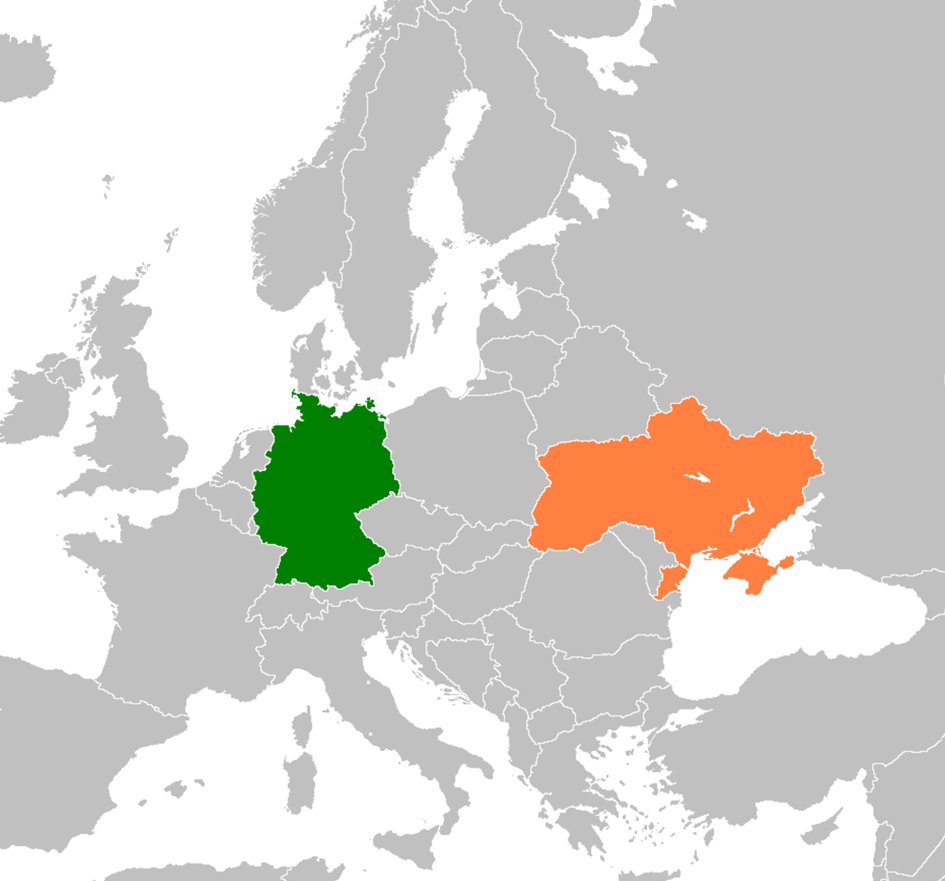 " title="Why does Germany act so indecisive & unreliable at supporting Ukraine& #39;s defense efforts?It& #39;s not moral or economic risk management. It& #39;s a mix of cultural isolationism, soviet propaganda and strategic infiltration by Putin’s assets deep into political & cultural leadership. https://abs.twimg.com/emoji/v2/... draggable="false" alt="🧵" title="collectie" aria-label="Emoji: collectie">" class="img-responsive" style="max-width:100%;"/>
" title="Why does Germany act so indecisive & unreliable at supporting Ukraine& #39;s defense efforts?It& #39;s not moral or economic risk management. It& #39;s a mix of cultural isolationism, soviet propaganda and strategic infiltration by Putin’s assets deep into political & cultural leadership. https://abs.twimg.com/emoji/v2/... draggable="false" alt="🧵" title="collectie" aria-label="Emoji: collectie">" class="img-responsive" style="max-width:100%;"/>
